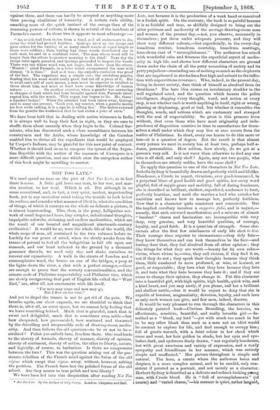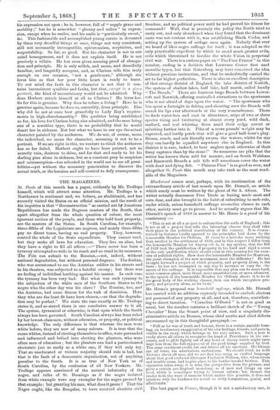NOT TOO LATE.*
WE need spend no time on the plot of Not Too Late, as in fact there is none. A little girl loves one man, to her woe, and mar- ries another, to her weal. Which is all. But although in no sense sensational, and, in fact, a very quiet, modest, unpretending book, yet to any masculine mind taking the trouble to look below its surface, and consider what manner of life it is, what the condition of things, of which it conveys on the whole so delicate a picture, it is almost heartrending. This, then, is the puny, Lilliputian net- work of small hopes and fears, tiny scruples, infinitesimal thoughts, impalpable cobwebs, sickening and endless mediocrities, which are the result of our boasted and magnificent nineteenth-century civilization ! It would be so, were the whole life of the world, the whole scope of man, all contained in the two volumes before us. Luckily for our peace of mind, when we slowly awake from the trance of perusal to feel all the hobgoblins in full tilt upon our stomach, and our head tethered to the ground by a thousand gossamer threads, we need only rise and shake ourselves to recover our equanimity. A walk in the streets of London and a contemplative weed, the breeze on one of the bridges, a peep at the lights down the river, a chat with a perfect stranger,—these are enough to prove that the nursery conventionalities, and the minute code of Philistine respectability and Philistine vice, which are slowly overgrowing that part of English life called the West End," are, after all, not coextensive with life itself.
"For mon may come and men may go,
But I flow on for ever."
And yet to dispel the trance is not to get rid of the pain. We breathe again, our chest expands, we are thankful to think that there is, after all, an outer space, but we cannot help feeling that we leave something behind. Much that is graceful, much that is sweet and delightful, much that is sometimes even noble—but how chequered, how piecemealed, how scattered and thwarted by the drivelling and irrepressible code of drawing-room medio- crity. And then follows the old question—to be or not to be— civilized ? Polish (so-called) here, freedom there. One road leads to the slavery of formula, slavery of manner, slavery of opinion, slavery of sentiment, slavery of action, the other to liberty, nature, and logically, of course, to barbarism. Is there no compromise between the two ? This was the question arising out of the pas- sionate rebellion of the French mind against the Salon of the old regime which swept that re'ginte away, without, however, solving the problem. The French have lost the polished forms of the old school. Are they nearer to true polish and true liberty?
We have been led into this disquisition after reading Not Too
* Not Too Lete. By the Author of Oe'y George. London; Chapman and Hall.
Late, not because it is the production of a weak hand or conceived in a foolish spirit. On the contrary, the book is so painful because it is so faithful and true, so skilfully designed to bring out the utter pettiness and mediocrity of the average drawing-room man and woman of the present day,—not, you observe, necessarily io themselves ; put them under adequate pressure, and they will show very different colours,—but superficially, in the every-day humdrum routine, humdrum courtship, humdrum marriage, hum-drum cant of "accomplishment." The authoress has seized with wonderful calm and firmness the superficial aspect of medio- crity in high life, and shown how different characters are ground down under the chain of all the petty necessities of society and its petty prejudices—reminding one of nothing so much as the elephants that are imprisoned in stockades a foot high and submit to the inflic- tion with superstitious reverence. Who, indeed, in the present day, living in decent society, dare think of himself as absolved from its thraldoms? The bare idea causes an involuntary shudder in the well regulated mind, and the question which haunts the polite- intelligence, dogging every thought, word, and action at every step, is not whether each is worth anything in itself, right or wrong, pleasing or displeasing, good or bad, but whether it resembles the- thoughts, words, and actions which are customary and stamped with the seal of respectability. So great is this pressure from without, that even those who have most originality and inde- pendence of disposition contrive in time to manufacture for them- selves a shell under which they may live at ease secure from the malice of Philistines. In short, every one learns to do this more or less—it is a question of degree. But the result is that almost every person we meet in society has at least two, perhaps half-a- dozen, personalities. How seldom, how slowly, do we get at a person's very self. Is it not rarer than otherwise to find any one who is all shell, and only shell ? Again, may not two people, who in themselves are utterly unlike, have the same shell ?
To apply this question to one of the characters in Not Too Late. Isabella Sydney is beautifully drawn and perfectly vivid and lifelike. Handsome, a Creole in aspect, vivacious, ever good-humoured, in a perpetual blaze of good health and good spirits, her every word playful, full of supple grace and mobility, full of daring frankness, she is described as brilliant, shallow, superficial, a schemer to boot, perfectly heartless, and until she marries a lord who satisfies her ambition and knows how to manage her, perfectly faithless_ Now that is a character quite consistent and conceivable. But the implied corollary involves a suggestio falsi, and is unjust,— namely, that such outward manifestation and a mixture of almost " insolent " charm and fascination are incompatible with very deep, very genuine, and very beautiful qualities, of courage, loyalty, and good faith. It is a quest ion of strength. Some cha- racters after the first few mischances of early life elect to live. Their courage rises superior to circumstance—they defy fate— they know themselves and can look themselves in the face—and having done that, they feel absolved from all other opinion ; they like things for what they are worth —beauty for its own sake— virtue, where virtue is,—vice, they call vicious, if they find it so,. not if they do not ; they speak their thoughts because they think them, little cumbered to seem profound, or wise, or learned, or good, or respectable ; they love what they love because they love it, and hate what they hate because they hate it ; and if they see cause to change their opinion, they change it. Put this character into a beautiful girl, with high spirits, high health, quick wits, and. a kind heart, and you may easily, if you please, call her a brilliant, and shallow rattle,—but it would be unjust to deny that she is capable of heroism, magnanimity, devotion, loyalty, and such love as only such women can give, and few men, indeed, deserve.
It would be very pleasant to run through the characters in this delicately painted book—Clarissa Brandling, the heroine, an affectionate, sensitive, beautiful, and really loveable girl — de- scribed as a "blank, my lord "—yet with much too much in her to be any other blank than such as a man not an idiot would be content to explore for life, and find enough to occupy him full of gentle warmth, with a faint colour in her cheek which came and went, her hair golden in shade, but her eyes and eye- lashes dark, and eyebrows finely drawn, "not regularly handsome, but with great sweetness and variety of expression, and a ready sympathy and friendliness in her manner, which was entirely simple and unaffected." Her picture throughout is simple and natural. The hero, a curate whom the authoress hates and. despises, is a more complex animal, and to be candid, only con- sistent if painted as a portrait, and not merely as a character. Herbert Sydney is described as a delicate and refined-looking young man, with Creole blood. He is "full of accomplishments" (of course) and "varied charn3,"—his manner is quiet, rather languid, his expression not open ; he is, however, full of "supple grace and mobility ;" but he is somewhat "gloomy and sullen" in expres- sion, except when he smiles, and his smile is "particularly sweet," &c. This fashionable and accomplished young curate is devoured by three very dreadful things at once, things not very consistent, still not necessarily incompatible, epicureanism, scepticism, and respectability. So far, so good. But the character is not to our mind homogeneous, and it does not explain itself. He is not precisely a villain. He has even given seeming proof of abnega- tion and principle. He is only selfish, and mean, and dreadfully familiar, and languidly arrogant, and, as Clarissa tells him truly enough on one occasion, "not a gentleman," although she loves him so that her poor little heart is ready to burst. To our mind the fault in this character is not that it con- tains inconsistent qualities and faults, but that, except in a given portrait, the kind of inconsistency would not be admitted. Why does Herbert attach himself at all to Clarissa ? He loves her. So far this is genuine. Why does he refuse a living? Here he is genuine again, because he does so, ostensibly, from principle. Else why did he not at once bow gracefully to Lady Ray's require- ments in high-churchmanship ? His qualities being established so far, his love for Clarissa being also admitted, and the man being one of a sensitive type, there is no probability that he would desert her in sickness. Not but what we have in our eye the actual character painted by the authoress. We do not, of course, mean the individual, we mean the character, assuming it not to be a portrait. If we are right in this, we venture to think the authoress has so far failed. Herbert ought to have been painted, not as secretly vain, desirous to shine, and for that end ready to let his darling pine alone in sickness, but as a constant prey to suspicion and misconception—too schooled in the world not to see all possi- bilities—yet without the necessary penetration to discover the actual truth, or the heroism and self-control to defy consequence.































 Previous page
Previous page